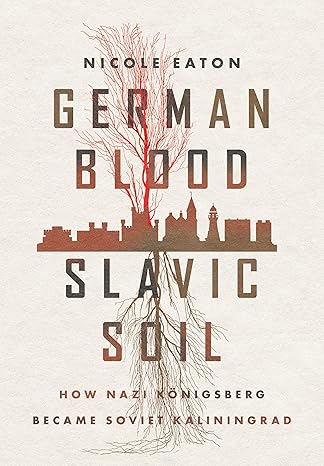Prize
Reginald Zelnik Book Prize in History
Meet the 2024 Recipients
View all past recipients
2024 Reginald Zelnik Book Prize in History
Nicole Eaton
German Blood, Slavic Soil: How Nazi Königsberg Became Soviet Kaliningrad
Read the Citation2024 Reginald Zelnik Book Prize in History
Honorable Mentions
Serhiy Bilenky and Oksana Sarkisova & Olga Shevchenko
Read the CitationThe Reginald Zelnik Book Prize in History, established in 2009 and sponsored by the Institute of Slavic, East European, and Eurasian Studies at the University of California, Berkeley, is awarded annually for an outstanding monograph published on Russia, Eastern Europe or Eurasia in the field of history in the previous calendar year. The Reginald Zelnik Book Prize in History carries a cash award. The award is presented at the ASEEES Annual Convention.
Rules of Eligibility
Rules of eligibility for the Reginald Zelnik Book Prize in History competition are as follows:
- The publication date inside the book must list the previous calendar year as the date of publication. For example, the book must have been a publication date of 2023 to be eligible for the 2024 competition. If no publication date is listed, the copyright date will be taken as the publication date.
- The book must be originally in the form of a monograph, preferably by a single author, or by no more than two authors.
- The book must be originally published in English.
- Authors may be of any nationality.
- Works should deal with any area of Russia, Eastern Europe, or Eurasia.
- The competition is limited to works of historical scholarship broadly understood.
- Textbooks, collections, translations (including self-translations), bibliographies, and reference works are ineligible.
- Self-published books are ineligible.
Nominating Instructions
A book can be nominated by the publisher or the author only. The nominator (publisher or author) is responsible for sending copies of the book to the prize committee members.
Fill out and submit this form to notify the Association of your intent to nominate a publication for the Zelnik prize. As of 2020, books may only be nominated for two prizes (e.g., this prize and one other).
Send one copy of eligible monograph to each Committee member (see addresses below). The nomination form must be submitted by no later than April 15. And books must be received by no later than May 15 (books not received by the deadline may not be considered).
Submissions should be clearly marked “Reginald Zelnik Book Prize Nomination.”
Questions should be directed to aseees-prizes@pitt.edu.
2025 Reginald Zelnik Book Prize in History Committee
The winner of the 2024 Reginald Zelnik Book Prize in History will be chosen by the following scholars. For questions, please contact ASEEES at aseees-prizes@pitt.edu or 412-648-9911..
COMMITTEE CHAIR
Stephen Norris
Miami University of Ohio, 2024-2025
Print books are preferred. Please send them to:
Stephen Norris
5750 Genevieve Pl.
Fairfield, OH 45014
Where needed, ebooks will be accepted. They can be sent to: norriss1@miamioh.edusadphill@indiana.edu
Małgorzata Fidelis
University of Illinois at Chicago, 2024-2026
Print books are preferred. Please email aseees-prizes@pitt.edu for the mailing address.
Where needed, ebooks will be accepted. They can be sent to: gosia01@uic.edu
Eren Tasar
UNC at Chapel Hill, 2025-2027
etasar@email.unc.edu
(For customs use): Please mark the nominated books as “gift” to alert Customs that this is not a commercial shipment/to insure the recipient does not have to pay for the items.
Past Winners
The following scholars received the Reginald Zelnik Book Prize in History in the past:
Click to Read Award Citations
- 2024 Nicole Eaton
- 2024 Honorable Mentions
- 2023 Alexander Martin
- 2023 Honorable Mentions
- 2022 Andrew Kornbluth
- 2022 Vladislav Zubok
- 2021 Anita Kurimay
- 2021 Krista A. Goff
- 2020 Brendan McGeever
- 2020 Kate Brown
- 2020 Honorable Mention
- 2019 Sarah Cameron
- 2019 Honorable Mention
- 2018 Lynne Viola
- 2018 Honorable Mention
- 2017 Aileen Kelly
- 2017 Honorable Mention
- 2016 Adeeb Khalid
- 2016 Honorable Mention
- 2015 Agnès Nilufer Kefeli
- 2015 Honorable Mention
- 2014 Stephen K. Batalden
- 2014 Honorable Mention
- 2013 Scott Ury
- 2013 Honorable Mentions
- 2012 Tracy McDonald
- 2012 Honorable Mentions
- 2011 Matthew Lenoe
- 2011 Honorable Mention
- 2010 Robert Edelman
- 2010 Honorable Mentions
- 2009 Elena Shulman
- 2009 Honorable Mention
More ASEEES Prizes
See more PrizesRobert C. Tucker/Stephen F. Cohen Dissertation Prize
The Robert C. Tucker/Stephen F. Cohen Dissertation Prize is awarded annually for an outstanding English-language doctoral dissertation in Soviet or Post-Soviet politics and history in the tradition practiced by Robert C. Tucker and Stephen F. Cohen. The dissertation must be defended at an American or Canadian university.Read more
Beth Holmgren Graduate Student Essay Prize
The Beth Holmgren Graduate Student Essay Prize is awarded for an outstanding essay by a graduate student in Slavic, East European, and Eurasian Studies.Read more
W. Bruce Lincoln Book Prize
The W. Bruce Lincoln Book Prize is awarded annually for an author's first published monograph or scholarly synthesis that is of exceptional merit and lasting significance for the understanding of Russia's past.Read more